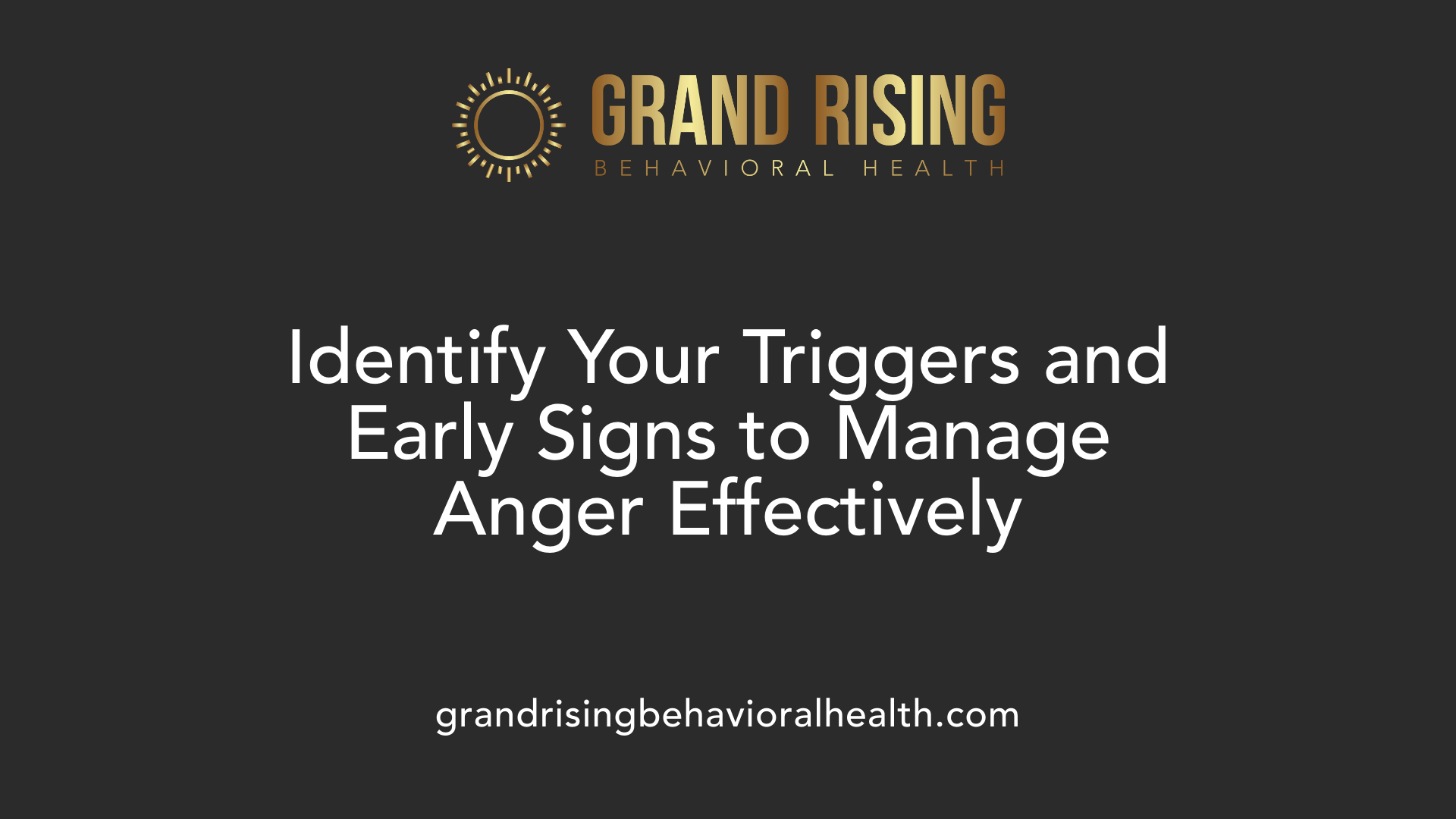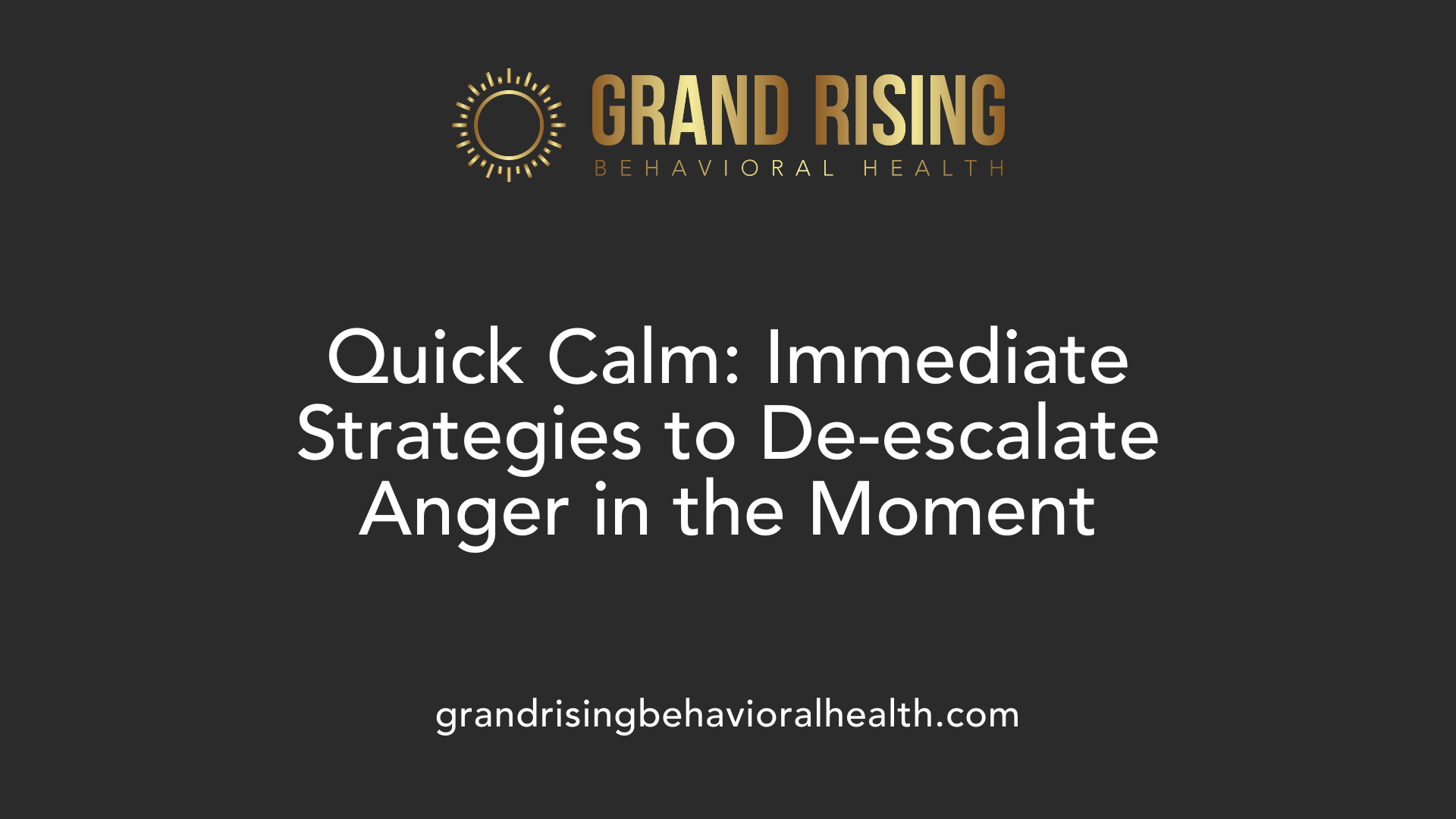How to manage anger in healthy and constructive ways
Mastering Your Emotions: Effective Strategies for Calm and Constructive Anger Management

Understanding and Navigating the Complex Landscape of Anger
Anger is a universal human emotion that, when understood and managed properly, can be a catalyst for positive change rather than a source of chaos. Recognizing its biological underpinnings, emotional significance, and practical ways to handle it is crucial for mental and physical health. This article explores the nature of anger, signs of escalating emotional states, and effective strategies to express and control anger in healthy ways, fostering better relationships and emotional well-being.
The Biological and Emotional Purpose of Anger

What are the biological and emotional purposes of anger?
Anger is a fundamental human emotion with deep evolutionary roots that serve important survival functions. Biologically, anger triggers an array of physiological changes designed to prepare us for immediate action. When angry, the body responds by increasing the heart rate, raising blood pressure, and releasing energy hormones like adrenaline and cortisol. These responses activate the fight-or-flight mechanism, enabling individuals to protect themselves from perceived threats or confront challenges directly.
From an emotional perspective, anger acts as a signal that one's personal boundaries, social norms, or core needs have been violated. It heightens awareness of injustice, unfair treatment, or threats, motivating action to resolve conflicts or assert oneself. In social contexts, anger can serve to communicate discontent or adversity, helping to establish boundaries or clear up misunderstandings.
Furthermore, anger can indicate threats to one's social standing or reproductive opportunities, prompting behaviors that defend or enhance personal or group interests. It plays a role in societal cohesion by establishing social hierarchies or signaling the need for change.
By driving individuals to address injustice or defend their rights, anger supports adaptation to complex social environments. It promotes problem-solving, assertiveness, and the protection of personal and social well-being.
Overall, anger's dual purpose—biological and emotional—allows humans to respond swiftly to threats, uphold social norms, and foster social bonds, ensuring both individual survival and the cohesion of groups.
Recognizing Triggers and Warning Signs of Anger

What are common triggers that lead to anger?
Anger can be provoked by various everyday situations. Common triggers include experiencing stress from a busy schedule or personal life, witnessing injustice or unfair treatment, or feeling threatened—either physically or emotionally. Personal frustrations such as unmet needs, unfulfilled expectations, or perceived disrespect also frequently spark anger.
External triggers, like traffic jams, conflicts at work or home, and delays, often act as immediate catalysts. Internal factors such as chronic stress, low self-esteem, or unresolved past issues can increase susceptibility to anger, making individuals more reactive when triggered.
Understanding these triggers allows for better preparation and proactive management to prevent anger from spiraling out of control.
How can physical signs indicate rising anger?
Physical reactions are among the earliest indicators that anger is intensifying. Typical signs include a racing heart, faster breathing, clenched fists, tense muscles, and face flushing. Some people experience dry mouth, headaches, or stomach discomfort, which are physiological responses to emotional arousal.
Feeling hot or sweaty and noticing muscle tightness or trembling can also be signs that anger is escalating internally. Recognizing these cues enables individuals to take steps like breathing deeply or stepping away before anger reaches a breaking point.
What psychological signs suggest someone is getting angry?
Psychologically, escalating anger manifests as irritability, increased agitation, or a sense of disrespect. Individuals may start rumination, replaying perceived wrongs, or obsess over retaliatory thoughts. Feelings of humiliation, frustration, or unfairness can seem overwhelming.
Some might also experience negative internal dialogues, such as blaming others or feeling misunderstood. When these emotional signs appear, they indicate a need to employ calming strategies or process underlying issues constructively.
How is constructive expression of anger achieved without causing harm?
Expressing anger constructively requires focusing on the problem rather than attacking people. This involves calmly communicating your feelings using 'I' statements, avoiding blame, and clearly articulating your needs.
Practicing emotional regulation skills like pausing, deep breathing, or reframing thoughts can help maintain respectfulness. Physical outlets such as exercise, or writing down emotions, channel anger into productive activities.
Using humor to lighten the mood and engaging in courageous conversations to address issues directly can foster understanding and resolution.
Ultimately, managing anger constructively involves awareness of triggers, exploring its root causes, and applying strategies that promote healing and growth without causing harm to oneself or others.
| Trigger Type | Examples | How to Manage |
|---|---|---|
| External Stress | Traffic, work conflicts, relationship disputes | Take breaks, practice breathing, remove yourself from situation |
| Internal Factors | Unmet needs, low self-esteem, past trauma | Seek support, reflect, and develop coping strategies |
| Emotional Triggers | Feeling disrespected, humiliated | Use assertive communication and self-awareness |
| Situational Triggers | Delays, frustrations with when waiting | Plan ahead, adjust expectations, practice patience |
This awareness and early recognition of warning signs enable effective management, helping to reduce the risk of harmful reactions and fostering healthier emotional responses.
Immediate Techniques to Calm Down Anger

What immediate steps can be taken to calm down anger in the moment?
When anger starts to rise, it’s essential to act promptly to prevent it from spiraling out of control. One of the most effective immediate strategies is to practice deep breathing exercises. Techniques such as diaphragmatic breathing or square breathing help activate the body's relaxation response, reducing physiological arousal. For example, inhaling slowly for four seconds, holding the breath for four seconds, and then exhaling slowly for four seconds can center your mind and body.
Taking a timeout or stepping away from the trigger situation is also highly beneficial. This distance allows emotional and physical tension to subside. Even a brief pause of 20 to 30 seconds can give you enough space to gather your thoughts and prevent impulsive reactions.
Distraction methods are useful tools to divert attention from anger-provoking thoughts. Engaging in physical activity like a quick walk, stretching, or even dancing can help burn off tension. Visualization techniques, such as imagining a peaceful scene or focusing on calming surroundings, can shift your focus from anger to tranquility.
Recognizing early physical and emotional cues, such as a pounding heart, clenched fists, or shallow breathing, allows you to intervene before anger escalates. When you notice these signs, prompt action with grounding exercises, positive self-talk, or mindfulness strategies to regain control.
Additional tactics include holding onto a grounding object, like a stress ball or a familiar bracelet, or silently repeating a calming phrase in your mind. These steps help maintain emotional balance and promote a sense of calm during intense moments.
By combining these techniques, individuals can effectively de-escalate anger quickly, fostering healthier reactions and preserving relationships.
The Role of Therapeutic Interventions

Are there therapeutic approaches that can assist with anger management?
Yes, many therapeutic strategies are available to help manage anger effectively. Among these, cognitive-behavioral therapy (CBT) stands out as the most well-researched and proven method. CBT helps individuals identify negative thought patterns, triggers, and physiological reactions tied to anger, enabling them to reframe thoughts and develop healthier responses. For example, instead of reacting impulsively, a person learns to recognize warning signs and choose calm, assertive communication.
Other effective approaches include mindfulness-based stress reduction (MBSR), which involves practices like meditation and deep breathing to increase present-moment awareness and reduce emotional reactivity. Dialectical behavior therapy (DBT), originally designed for emotional regulation issues, also offers tools such as emotion regulation skills and distress tolerance.
Structured anger management programs typically combine relaxation techniques, cognitive restructuring, and social skills training. These programs teach coping skills like problem-solving, cooling-off techniques, and conflict resolution. They aim not to suppress anger but to allow individuals to express it in a constructive, controlled manner.
Overall, personalized therapy helps individuals develop practical skills, improve relationships, and enhance overall well-being by promoting emotional regulation and reducing impulsive behaviors.
How can understanding the psychological aspects of anger help in managing it?
Recognizing the psychological roots of anger is crucial. Often, anger masks deeper feelings such as fear, shame, frustration, or hurt. By understanding these underlying emotions, individuals can address the actual issues rather than only the outward expression of anger. This insight enables healthier responses, like assertive communication or problem-solving.
Understanding triggers—such as perceived injustice, threats, or feelings of vulnerability—supports the development of specific coping strategies. For example, cognitive restructuring involves challenging exaggerated negative thoughts, which can escalate anger, and replacing them with balanced, rational perspectives.
Furthermore, awareness that anger may be an automatic response due to biological or emotional processes empowers individuals to utilize calming techniques before reacting. Recognizing physical signs like clenched fists, racing heart, or flushed face allows for early intervention.
By addressing the core emotions and recognizing bodily signs, people can process anger more constructively. This insight supports emotional regulation, reduces destructive outbursts, and fosters healthier social interactions.
Additional support options
Beyond individual therapy, support groups, online resources, and educational programs provide guidance on healthy anger management. Many apps and online podcasts focus on emotional regulation and stress reduction, making these tools accessible for ongoing self-care.
In summary, therapeutic approaches tailored to individual needs play a vital role in improving anger control, thereby enhancing mental health, physical health, and relationships.
The Physiological Reactions and Management of Anger
What are the signs that indicate someone is experiencing anger or that anger might escalate?
Signs of anger can manifest both physically and psychologically. Early physical indicators include clenched fists, a reddening face, tight muscles, rapid breathing, and an increased heart rate. These reactions are part of the body’s fight-or-flight response, preparing an individual to confront or flee from a threat.
Physiologically, anger triggers the release of adrenaline—the body’s stress hormone—which raises blood pressure and energizes muscles. You might notice sensations like a pounding heart, flushed skin, or a feeling of heat spreading through your body. These signs signal escalating tension and alert you to take measures to calm down.
Some subtle signs are feelings of frustration, irritability, or disrespected and humiliated sensations that may not be immediately obvious. Cognitive signs may include dwelling on revenge, perceiving others as intentionally rude, or having thoughts of hurting someone. Such mental cues often accompany physical symptoms and can be warning signals of rising anger.
Behaviorally, individuals might start raising their voice, arguing, or displaying aggressive actions like slamming doors or breaking objects. Recognizing these signs early provides an opportunity to intervene before anger spirals into harmful actions.
Understanding and identifying these signs—whether physical, emotional, or behavioral—are crucial for managing anger effectively. Techniques like deep breathing, mindfulness, or stepping away from provoking situations can help mitigate these physiological responses and prevent escalation.
Environmental and Lifestyle Factors in Managing Anger
How can understanding the psychological aspects of anger help in managing it?
Understanding the psychological dimensions of anger is essential for effective management. Recognizing that anger often originates from deeper emotional states like pain, frustration, fear, or feelings of injustice allows individuals to address these core issues directly. When people identify their triggers — such as perceived threats or vulnerabilities — they can develop tailored coping strategies.
Practical approaches include cognitive restructuring, which involves challenging and changing negative or exaggerated thoughts that escalate anger. Becoming self-aware of one’s emotional and bodily responses helps in noticing early signs of anger and preventing escalation.
Moreover, understanding that anger often masks underlying emotions like hurt or shame encourages healthier outlets for these feelings. This awareness facilitates assertive communication and emotional regulation, reducing the chances of harmful reactions.
Psychologically informed anger management also benefits from acknowledging biological factors — such as how the functioning of the prefrontal cortex aids in impulse control. By leveraging this understanding, individuals can employ techniques like mindfulness or deep breathing to enhance self-control.
Ultimately, grasping the psychological roots of anger promotes better emotional regulation, improving relationships and physical health by decreasing stress-related physiological reactions. This comprehensive approach empowers individuals to manage anger constructively and maintain overall well-being.
Managing triggers through environment control
Adjusting one's surroundings is an effective way to minimize anger triggers. This might include organizing personal spaces to foster calmness, setting realistic boundaries, and creating routines that reduce unpredictability and frustration.
The impact of stress, sleep, diet, and physical activity
Lifestyle choices play a significant role in how easily one becomes angered. Chronic stress, poor sleep, an unhealthy diet, and lack of exercise can heighten irritability and emotional reactivity. Improving sleep hygiene, eating balanced meals, engaging in regular physical activity, and practicing stress reduction techniques help stabilize mood and reduce anger outbursts.
Creating supportive social connections
Healthy relationships provide emotional support and help buffer against stress. Sharing feelings with trusted friends or family members can alleviate underlying tensions. Participating in social activities, support groups, or therapy sessions fosters understanding and promotes constructive coping mechanisms.
Long-term benefits
Incorporating these environmental and lifestyle modifications not only reduces immediate triggers but also builds resilience over time. Consistently managing stressors, ensuring adequate rest, maintaining a balanced diet, and nurturing supportive relationships contribute to a healthier emotional landscape, making anger easier to regulate and less disruptive.
The Power of Forgiveness and Humor in Emotional Regulation
How can anger be expressed constructively without causing harm?
Constructive anger expression focuses on addressing the issue rather than attacking the person involved. It involves using respectful language, 'I' statements to communicate feelings, and calmly articulating needs or concerns. By staying focused on the action or situation, individuals prevent escalation and protect relationships.
Practicing emotional self-awareness is vital. Pausing before reacting, taking deep breaths, or stepping away from heated moments allows time to respond thoughtfully. Writing down feelings or engaging in physical activities like exercise or creative pursuits channels anger positively. Humor, when used appropriately, can humorously diffuse tension and shift perspectives, reducing hostility.
Open, honest conversations aimed at resolving misunderstandings, rather than blaming, foster solutions and personal growth. Recognizing triggers and exploring underlying causes—such as stress or frustration—can further guide constructive responses. Managing anger ethically involves understanding its roots, controlling reactions, and choosing strategies that promote resolution without harm.
How can understanding the psychological aspects of anger help in managing it?
Grasping the psychological underpinnings of anger reveals that it often masks deeper feelings like fear, shame, or sadness. Recognizing these underlying emotions enables individuals to process the real issues rather than just reacting to surface anger. For example, perceived threats or injustices may trigger anger, but they sometimes stem from vulnerability or unmet needs.
By identifying triggers—whether external, like unfair treatment, or internal, such as stress—people can develop skills like cognitive restructuring to challenge negative thoughts or practice mindfulness to stay present.
Understanding that anger might be a response to emotional wounds makes it easier to approach the problem compassionately. This insight encourages healthier coping mechanisms, such as assertive communication or seeking therapy, which address the core problems.
Physiologically, anger involves activation of the brain's emotional centers, but the prefrontal cortex helps us evaluate situations rationally. Strengthening this connection through self-awareness and emotional regulation training can prevent escalation.
Ultimately, psychological insight empowers better self-control, supports healthier interactions, and fosters emotional resilience—crucial elements for managing anger constructively and maintaining overall well-being.
Building a Path Toward Emotional Balance
Managing anger in healthy and constructive ways is essential for maintaining mental, emotional, and physical health. Recognizing the biological and emotional functions of anger provides insight into its role as a signal that something needs attention. Early identification of triggers and warning signs allows for prompt intervention, whether through relaxation techniques, cognitive restructuring, or physical activity. Therapeutic approaches such as CBT, mindfulness, and counseling offer effective pathways for those struggling with anger regulation. Importantly, expressing anger assertively—rather than aggressively—along with practicing forgiveness and humor, fosters healthier relationships and emotional resilience. Developing a comprehensive anger management plan, which includes self-awareness, proactive stress management, and seeking support when needed, creates a foundation for a more balanced, peaceful life. Ultimately, mastering these strategies empowers individuals to respond thoughtfully, ensuring their well-being and those around them.
References
- Control anger before it controls you
- Anger management: 10 tips to tame your temper - Mayo Clinic
- Feeling ragey? Don't bury your anger, process it. Here's how - NPR
- 10 Healthy Ways to Release Rage | Mental Health America
- Managing and expressing our anger in healthy ways-230731
- 11 Anger Management Strategies to Help You Calm Down
- 6 Healthy Ways to Deal With Anger | TIME
- Cool Down: Anger and how to deal with it | Mental Health Foundation
- Managing Anger in Healthy Ways - weareallied.org
More Resources
A team ready to start your journey.
Get in touch — today.
We are a safe space – a haven for exceptional individuals to receive discreet, personalized, in-person treatment and care.
.avif)










